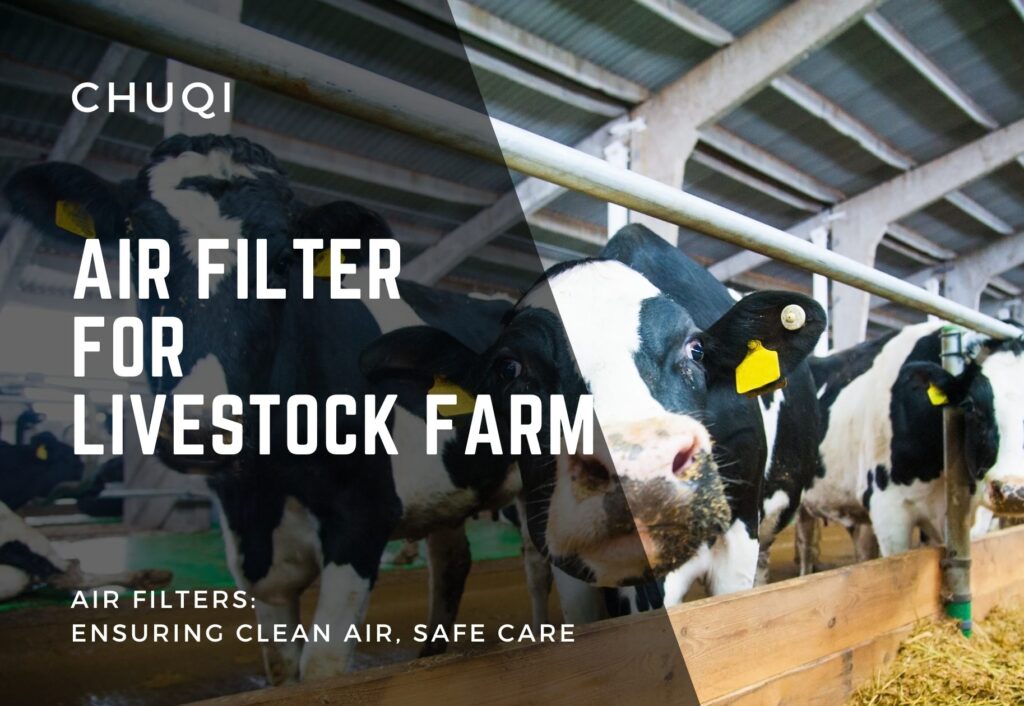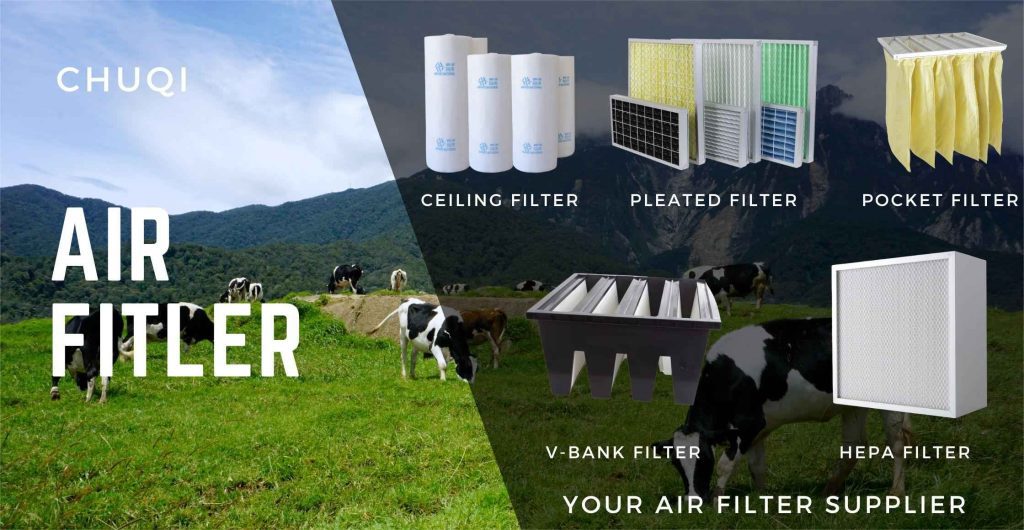Strict control of air quality is particularly important for cattle farms because it is directly related to the health of the herd, which in turn affects the body condition of the cattle, feed intake and milk production. Threats are mainly reflected in the two major aspects of pathogenic microorganisms and harmful gases.
For example, Mycoplasma bovis and Pasteurella can easily cause respiratory diseases in cattle, leading to decreased growth performance. Ammonia is not only a strong irritant to the mucous membranes of cattle, but also affects their digestion and absorption, while hydrogen sulfide may lead to cattle poisoning. These air quality problems, if not solved, will bring great losses to cattle farms.
The working principle of air filter
The air filter plays a key role in cattle farming. It intercepts vectors such as dust particles and bioaerosols, mainly through a number of principles.
The air is filtered and intercepted through inertia principle/interception principle/irregular Brownian motion/electrostatic effect, thus realizing the purpose of filtering pathogens and purifying the air in cattle farms, and creating a healthier growing environment for the cattle.
Epidemic prevention effect of air filter
Air filters play a vital role in the prevention of disease in cattle farms.
According to relevant studies, the blue ear disease in the United States causes huge losses to the pig industry every year. However, after the installation of air filters, the risk of PRRS infection can be drastically reduced.
For example, statistics from 41 pig farms in the U.S. show that the annual outbreak rate dropped to 8% in farms with air filters installed in some areas, and only 4% in farms with air filters installed in all areas.
Not only that, but air filters are also effective in preventing large-scale outbreaks of diseases such as swine flu. By intercepting airborne dust particles of 0.3-1 micron, which are the main vectors of pathogens, the path of disease transmission is blocked.
Under laboratory conditions, pigsties fitted with air filters have not been infected with viruses for four consecutive years. This proves the effectiveness of air filters in preventing large-scale disease outbreaks.
Selection and Use of Air Filters
(I) Primary Air Filters
Primary air filter is characterized by cheap, light weight, good versatility and compact structure.
It has four styles: panel filters, pleated filters, pocket filters and box type, with various frame materials, including paper frame and aluminum alloy frame.
Filter materials include non-woven fabric, nylon mesh and so on.
It is mainly used for central air-conditioning and centralized ventilation system filtration, large air compressor filtration, clean return air system and pre-filter system of medium and high efficiency filtration device. It is generally applicable to the primary filtration stage with low requirements for air purification.
(II) Medium Efficiency Air Filters
Medium efficiency air filters is produced by hot melting process, with stable structure, large air volume, low resistance, high dust capacity and repeatable cleaning.
It is mainly used for filtering dust with a particle size of 1-10μm, and the filter materials used are non-woven fabric and glass fiber.
Medium-effect air filter is suitable for intermediate filtration of central air-conditioning ventilation system, pharmaceuticals, hospitals, electronics, food and other industrial purification, and can also be used as the front-end filtration of high-efficiency filtration in order to reduce the load of high-efficiency filtration and extend its service life.
(III) High Efficiency Air Filters
HEPA filters can effectively intercept particles of dust in the air of 0.3 – 1 micron, with high filtration efficiency, which can significantly cut off the airborne pathways of pathogens. It is commonly used in places with very high requirements for air quality, such as the key areas of farms.
(D) Tthe correct use and maintenance points
- Before installation, clean the installation environment to ensure that there is no dust and debris.
- When installing, pay attention to the direction of the filter to make it consistent with the direction of airflow.
- In the process of use, check the working status of the filter regularly, and deal with it in time if any abnormality is found.
- The replacement frequency of the primary and intermediate filters varies according to the usage environment, and they are generally replaced once every 1-3 months. High-efficiency filters should be replaced according to the pressure difference or usage time.
- When cleaning the filter, choose the appropriate method according to the type of filter to avoid damaging the filter.
- When storing the filter, pay attention to moisture-proof and dust-proof to avoid affecting its performance.
Correct selection and use of air filters and good maintenance can ensure their long-term effective functioning and provide good air quality for cattle farms.
Economic benefits of air filters
Installing an air filter does require some initial investment, however in the long term the economic benefits are significant.
In terms of reducing the risk of disease, air filters are effective in intercepting pathogens and reducing the likelihood of cattle contracting disease. The spread of diseases such as blue ear and swine flu can be prevented. Reduced disease incidence means that cattle farms don’t have to invest as much money in treating and controlling disease, saving money on vaccine purchases, medication, and veterinary services.
Improving herd health directly contributes to farm profitability. Healthy cattle grow faster, produce more milk and have better meat quality. This allows cattle farms to earn higher revenues when selling products such as cattle, milk and beef.
Reduced treatment costs and losses are a direct financial benefit of air filters. When there are fewer sick cattle, treatment costs are dramatically reduced. At the same time, losses due to disease such as cattle deaths, growth retardation and reduced milk production can be effectively controlled.
The application of air filters for cattle farms as well as reducing the incidence of disease, improving the health of the herd, increasing the survival rate, but also in the milk production, growth rate, feed utilization and other aspects of the significant results, for cattle farms to bring considerable economic benefits and the potential for sustainable development.
In summary, although the installation of air filters requires an initial investment, the long-term economic benefits they bring far outweigh the initial costs in terms of reducing the risk of disease, improving herd health, and reducing treatment costs and losses, and are an important guarantee of sustainable development and profitability for cattle farms.


